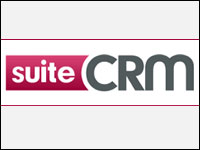
SalesAgility last week rolled out SuiteCRM, an application that’s designed to offer a fully open source alternative to SugarCRM Professional Edition.
Built upon the latest release of SugarCRM Community Edition, the software includes reporting, workflow, quotes, products, security and portal extensions that are designed to deliver the functionality that was previously found only in the proprietary, paid-for editions of SugarCRM.
SuiteCRM also includes new functionality for event management and mapping that is not available in SugarCRM, SalesAgility said.
“Sugar has abandoned open source completely in recent years,” Greg Soper, SalesAgility‘s CEO, told CRM Buyer. “What we have done is taken the open source components of SugarCRM and added components that we wrote to offer something that is very similar to SugarCRM Professional Edition.”
So, “users now have choice,” he added. “They can get proprietary software from Sugar or use a free product that is the same.”
In the first 18 hours of SuiteCRM’s availability it was downloaded some 2,000 times, Soper said.
‘The Spirit of Open Source’
SugarCRM still bills itself as an open source-based application, Soper admitted.
“If you speak to Sugar they will say they are not abandoning open source,” he noted, “but speak to the community and they will tell that, yes they are. Sugar is not contributing to the community; it has walked away from open source best practices.”
For instance, Sugar has not given a specific date when it will release its next Community Edition, Soper pointed out. “That is not the spirit of open source — it is open source without a project behind it.”
Sugar’s Rebuttal
SugarCRM does not see it in the same light.
“SugarCRM is committed to our Community Edition and our open source roots, ” Martin Schneider, head of product evangelism for SugarCRM, told CRM Buyer. “While we may have a larger and wider product and business scope moving forward, Community Edition will always exist as part of our overarching product line.”
Meanwhile, “we are thrilled that SalesAgility has built its offering upon our open source Community Edition,” Schneider continued. “That is, after all, in the spirit and nature of open source.
“Unfortunately, SalesAgility has chosen to do so while denigrating the very long-standing open source project on which their offering is based,” he added.
Making the Transition
Current users of SugarCRM Community Edition can switch to SuiteCRM via an upgrade process available on the SuiteCRM website, while new users can download the entire CRM application without any license charge.
SuiteCRM is compatible with SugarCRM, SalesAgility said, so custom functionality should transition as long as it has been developed using upgrade-safe methods. Extensions that integrate with SugarCRM will also integrate with SuiteCRM without any additional work, the company promised.
“SuiteCRM contains every module that is in the SugarCRM Profesional edition,” Soper explained. “It is the same functionality as the Standard Community Edition with the addition of quotes, contracts, invoices, product workflows, report generators and security features.
“There is also an events module that allows people manage events online, and the software integrates with Maps as well,” he added.
SuiteCRM’s code is licensed under the GNU General Public License version 3 and is available for contributions on Github.
Feature by Feature
A feature-by-feature comparison of SuiteCRM and SugarCRM suggests that the two applications are indeed very similar.
Both have accounts features that are standard. Ditto activity tracking and history. Both offer approvals and competitor tracking features as modules that can be built in Sugar Studio or made available as a downloadable application for free or at an additional fee. Business-to-business and business-to-consumer configurations are also standard features in both applications.
SuiteCRM’s fully open source nature, however, is its best feature, Soper said.
“We know that open source is inherently more secure and robust and will get developed faster because of the open source community,” he concluded. “We are talking about tens of thousands of developers.”
























































